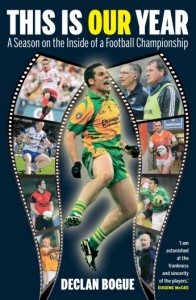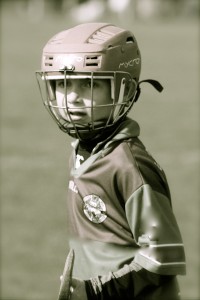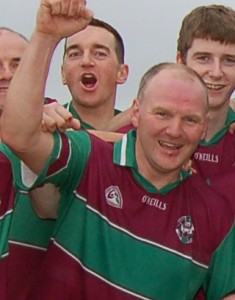
Book Review
“There is a destiny that makes us brothers,
No one goes his way alone;
All that we send into the lives of others,
Comes back into our own.”
Edwin Markham
A few years back Christy O’Connor wrote his seminal book about hurling goalkeepers – Last Man Standing.
It was a fantastic read offering a real insight into the minds of inter county players. Their mentality, their preparation, their hopes, their fears.
I remember vividly the passage about the Limerick keeper being hit with a sliotar on the testicle which duly disintegrated on impact. The things that struck about the book was that these were ordinary guys, fellas we all knew and if we didn’t know them we knew someone like them. A brother. Friend. Clubmate. A son. Nephew
The life of an intercounty player is monastic. Those that do it properly live for the game. They eat properly. They cut out the drink and the social life. They need to have understanding partners, wives, girlfriends. And as they get older it gets hard if they have children.
When I first heard about Declan Bogue’s book This is Our Year it didn’t really capture my imagination. An intercounty player from each team talking about the year they had had? Didn’t sound like something I would be bursting a gut to read. The usual platitudes. I would maybe give it a quick peruse in Easons to see if it was worth the cover price. I should have known better.
My attitude to books is straightforward. Having read enough badly written rubbish in my life so far I’m not one for wasting time reading books that don’t appeal. Paddy Russell’s book sits on my shelf. Pretty much unread. Dara Ó Sé unfinished. Brian Cody’s. Underwhelming.
In any book and a sports book in particular the writing must be good. The avoidance of dry, repetitious match details and player banalities is a skill in itself.
Trying to capture the appeal of a particular sport which is familiar to many of us is a difficult task. Trying to strike the balance between factual information and recounting details of matches that the readership will have attended. It is difficult. Some can manage it.
So approaching the whole concept of This Is Our Year in a pretty lukewarm fashion, I didn’t really pay much attention when it was serialised in Gaelic Life, where author Declan Bogue is Editor. These boys won’t say anything interesting I thought to myself and busied with reading the Big Interview.
Until one Thursday morning, sitting at the kitchen table drinking a cup of tea I started idly to read an extract about Dick Clerkin. I had always considered Clerkin an abrasive boy. I had watched him joust with Dara Ó Sé over the years. True or not, word was Ó Sé agreed to play a Railway Cup match for Munster because it would mean he was up against Clerkin. Here was a fella I had watched in action in Celtic Park. In Croker. I had my mind pretty much made up about the sort of fella he was.
Until I read the extract where he talked about his mother and the impact some of the criticisms of him by Joe Brolly and others were having. It was compelling stuff. It had all the passion and intimacy of our games. I know mothers of intercounty players. The big intercounty midfielder standing up for himself that we all see, is still the wee lad that kicked ball in the back garden. That’s what his mother sees.
Immediately after launch I spent a day or two scouring around the bookstores looking for the book to buy it. By that stage some of what Kevin Cassidy was saying about the Donegal set up was coming out. About the savagery of training. About the professionalism. About his own sacrifice and dedication. It confirmed what I had thought when I read the Clerkin extracts. This was good stuff. Eventually I tracked the book down and bought it. And boy but I enjoyed reading it.
The thing about gaelic games in Ulster is that it is inherently local. We know these boys. Our clubs play against them. We see them at matches. We see them hang over the wire at underage matches at their clubs. We see them coaching.
And then, on the big days we see them in Championship. Most of us don’t see them do what it takes to get them to Clones on Ulster Final Day. The sacrifice. The uncertainty. The self doubt. The savage commitment. Their expectations of aspects of their set up. The disappointment when injury strikes. The excitement when new management meets expectations. The unspoken dissatisfaction when it doesn’t.
The brilliance of Declan Bogue’s book is that has managed to get a group of intercounty players to trust him with their thoughts. It is the honesty and insight that makes it compelling reading. At times if I were to quibble I would say I rushed past accounts of matches that I watched or was at but that is a necessary part of the structure. For others that will help.
The irony in the fall out from the Donegal camp following the book’s publication is that one of the Ulster counties – Cavan – was represented by their management Val Andrews. Andrews has his own fair share of achievement and evidently saw no problem in taking part in a project that casts a searingly honest spotlight into the nooks and crannies of intercounty preparation. When I finished reading the Cassidy situation had snowballed and rolled out of control. The irony is he is nothing but complimentary about Jim McGuinness and his regime.
Others are less restrained. Paddy Cunningham is forthright and critical of the Antrim set up. I was surprised having read it that there was not comeback from the Antrim management. Maybe there will be but as with Alex Ferguson and Roy Keane’s comments, if there is a problem in the camp, fix it. Don’t talk about it or seek to nail the guy who has the balls to say we could do better.
Likewise, the most shocking passage in the book is not from one of the nine protagonists. Rather Ross Carr, father of one delivers an ultra critical attack on the Down management in defence of his son. He rails against Aidan’s lack of game time with Down. As a former manager I would have thought he would have been more restrained or circumspect but again, it is to the credit of the book and its author that he has managed to capture these passions. There it is, ugly or not. Like it or not.
The narrative structure is excellent as it successfully interweaves the stories through one another in much the same way Christy O’Conner did in Last Man Standing. It is written at times as third party observer of the player in his own natural environment. The fly on the wall offers a great insight into Cassidy’s kicking preparation at home at Magheragallon – a dedication to his craft that ultimately brought Donegal back into the game against Tyrone and earned a quarter final victory against Kildare.
Likewise the description of the day in Ballinascreen when Skinner Bradley damaged his knee. Bitingly honest. Accurate too. The players I have spoken to that were there have confirmed every word of even the smallest detail even before I ever read Bogue’s account.
In other places the main players recount in their own words. The fact that not all were top of the bill in the Championship adds to the interest.
Mickey Conlan of Derry troubled with injury, sacrificing everything to make the team including changing jobs, a decision which I think he would admit has benefitted him greatly. Barry Owens, brilliant player in a bruised and broken Fermanagh set up. My admiration there is greater than ever.
Ricey is perhaps the most reserved of the subjects. Cassidy has been well documented and harshly treated in my view. Aidan Carr’s story is one of a plane that never really took off. Val Andrews is insightful. Stevie McDonnell refreshingly honest. Paddy Cunningham may have a few extra sprints to do come pre season!
And last but not least Dick Clerkin. It was his account that brought me to the book. Since he has started writing for The Examiner. What Clerkin’s story tells us, if we didn’t need reminding, is that these boys are amateurs who are professional in everything else they do. So that the rest of us can chat about football the whole summer through. But, if something does go wrong, as it did for Dick, he still has a mother and a family to go home to. We would do well not to forget that.
Declan Bogue captures that. All of it. The essence of what it is to be a gaelic footballer in Ulster. Just because they are familiar doesn’t mean we know them. But after reading this, you will have a better idea of what it takes to get them to Clones on any given Sunday every summer. And that is what makes this tale of this particular band of brothers such a compelling read. Buy it. You won’t be disappointed.




